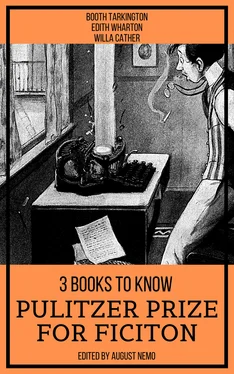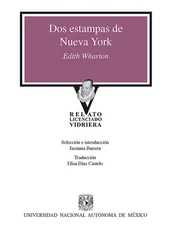“How'd they happen to do that?” his friend asked innocently.
“Oh, different things,” George answered lightly. “Of course, any of 'em that came from anywhere out in this part the country knew about the family and all that, and so I suppose it was a good deal on account of—oh, on account of the family and the way I do things, most likely.”
When Mr. George Amberson Minafer came home for the holidays at Christmastide, in his sophomore year, probably no great change had taken place inside him, but his exterior was visibly altered. Nothing about him encouraged any hope that he had received his come-upance; on the contrary, the yearners for that stroke of justice must yearn even more itchingly: the gilded youth's manner had become polite, but his politeness was of a kind which democratic people found hard to bear. In a word, M. le Due had returned from the gay life of the capital to show himself for a week among the loyal peasants belonging to the old chateau, and their quaint habits and costumes afforded him a mild amusement.
Cards were out for a ball in his honour, and this pageant of the tenantry was held in the ballroom of the Amberson Mansion the night after his arrival. It was, as Mrs. Henry Franklin Foster said of Isabel's wedding, “a big Amberson-style thing,” though that wise Mrs. Henry Franklin Foster had long ago gone the way of all wisdom, having stepped out of the Midland town, unquestionably into heaven—a long step, but not beyond her powers. She had successors, but no successor; the town having grown too large to confess that it was intellectually led and literarily authoritated by one person; and some of these successors were not invited to the ball, for dimensions were now so metropolitan that intellectual leaders and literary authorities loomed in outlying regions unfamiliar to the Ambersons. However, all “old citizens” recognizable as gentry received cards, and of course so did their dancing descendants.
The orchestra and the caterer were brought from away, in the Amberson manner, though this was really a gesture—perhaps one more of habit than of ostentation—for servitors of gaiety as proficient as these importations were nowadays to be found in the town. Even flowers and plants and roped vines were brought from afar—not, however, until the stock of the local florists proved insufficient to obliterate the interior structure of the big house, in the Amberson way. It was the last of the great, long remembered dances that “everybody talked about”—there were getting to be so many people in town that no later than the next year there were too many for “everybody” to hear of even such a ball as the Ambersons'.
George, white-gloved, with a gardenia in his buttonhole, stood with his mother and the Major, embowered in the big red and gold drawing room downstairs, to “receive” the guests; and, standing thus together, the trio offered a picturesque example of good looks persistent through three generations. The Major, his daughter, and his grandson were of a type all Amberson: tall, straight, and regular, with dark eyes, short noses, good chins; and the grandfather's expression, no less than the grandson's, was one of faintly amused condescension. There was a difference, however. The grandson's unlined young face had nothing to offer except this condescension; the grandfather's had other things to say. It was a handsome, worldly old face, conscious of its importance, but persuasive rather than arrogant, and not without tokens of sufferings withstood. The Major's short white hair was parted in the middle, like his grandson's, and in all he stood as briskly equipped to the fashion as exquisite young George.
Isabel, standing between her father and her son caused a vague amazement in the mind of the latter. Her age, just under forty, was for George a thought of something as remote as the moons of Jupiter: he could not possibly have conceived such an age ever coming to be his own: five years was the limit of his thinking in time. Five years ago he had been a child not yet fourteen; and those five years were an abyss. Five years hence he would be almost twenty-four; what the girls he knew called “one of the older men.” He could imagine himself at twenty-four, but beyond that, his powers staggered and refused the task. He saw little essential difference between thirty-eight and eighty-eight, and his mother was to him not a woman but wholly a mother. He had no perception of her other than as an adjunct to himself, his mother; nor could he imagine her thinking or doing anything—falling in love, walking with a friend, or reading a book—as a woman, and not as his mother. The woman, Isabel, was a stranger to her son; as completely a stranger as if he had never in his life seen her or heard her voice. And it was to-night, while he stood with her, “receiving,” that he caught a disquieting glimpse of this stranger whom he thus fleetingly encountered for the first time.
Youth cannot imagine romance apart from youth. That is why the roles of the heroes and heroines of plays are given by the managers to the most youthful actors they can find among the competent. Both middle-aged people and young people enjoy a play about young lovers; but only middle-aged people will tolerate a play about middle-aged lovers; young people will not come to see such a play, because, for them, middle-aged lovers are a joke—not a very funny one. Therefore, to bring both the middle-aged people and the young people into his house, the manager makes his romance as young as he can. Youth will indeed be served, and its profound instinct is to be not only scornfully amused but vaguely angered by middle-age romance. So, standing beside his mother, George was disturbed by a sudden impression, coming upon him out of nowhere, so far as he could detect, that her eyes were brilliant, that she was graceful and youthful—in a word, that she was romantically lovely.
He had one of those curious moments that seem to have neither a cause nor any connection with actual things. While it lasted, he was disquieted not by thoughts—for he had no definite thoughts—but by a slight emotion like that caused in a dream by the presence of something invisible. soundless, and yet fantastic. There was nothing different or new about his mother, except her new black and silver dress: she was standing there beside him, bending her head a little in her greetings, smiling the same smile she had worn for the half-hour that people had been passing the “receiving” group. Her face was flushed, but the room was warm; and shaking hands with so many people easily accounted for the pretty glow that was upon her. At any time she could have “passed” for twenty-five or twenty-six—a man of fifty would have honestly guessed her to be about thirty but possibly two or three years younger—and though extraordinary in this, she had been extraordinary in it for years. There was nothing in either her looks or her manner to explain George's uncomfortable feeling; and yet it increased, becoming suddenly a vague resentment, as if she had done something unmotherly to him.
The fantastic moment passed; and even while it lasted, he was doing his duty, greeting two pretty girls with whom he had grown up, as people say, and warmly assuring them that he remembered them very well—an assurance which might have surprised them “in anybody but Georgie Minafer!” It seemed unnecessary, since he had spent many hours with them no longer ago than the preceding August. They had with them their parents and an uncle from out of town; and George negligently gave the parents the same assurance he had given the daughters, but murmured another form of greeting to the out-of-town uncle, whom he had never seen before. This person George absently took note of as a “queer-looking duck.” Undergraduates had not yet adopted “bird.” It was a period previous to that in which a sophomore would have thought of the Sharon girls' uncle as a “queer-looking bird,” or, perhaps a “funny-face bird.” In George's time, every human male was to be defined, at pleasure, as a “duck”; but “duck” was not spoken with admiring affection, as in its former feminine use to signify a “dear”—on the contrary, “duck” implied the speaker's personal detachment and humorous superiority. An indifferent amusement was what George felt when his mother, with a gentle emphasis, interrupted his interchange of courtesies with the nieces to present him to the queer-looking duck their uncle. This emphasis of Isabel's, though slight, enabled George to perceive that she considered the queer-looking duck a person of some importance; but it was far from enabling him to understand why. The duck parted his thick and longish black hair on the side; his tie was a forgetful looking thing, and his coat, though it fitted a good enough middle-aged figure, no product of this year, or of last year either. One of his eyebrows was noticeably higher than the other; and there were whimsical lines between them, which gave him an apprehensive expression; but his apprehensions were evidently more humorous than profound, for his prevailing look was that of a genial man of affairs, not much afraid of anything whatever. Nevertheless, observing only his unfashionable hair, his eyebrows, his preoccupied tie and his old coat, the olympic George set him down as a queer-looking duck, and having thus completed his portrait, took no interest in him.
Читать дальше












